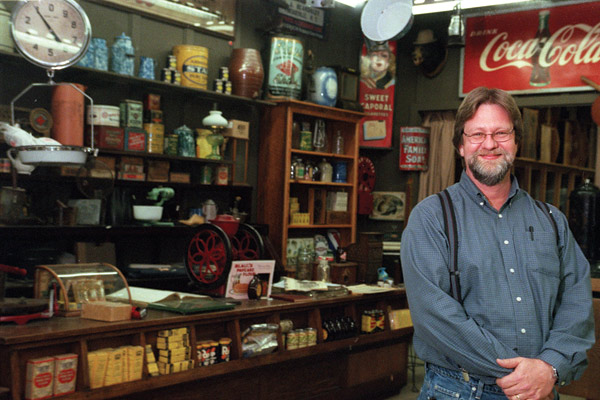Cracker Barrel Old Country Store operates more than 630 units in 42 states, each of which has 900 to 1,000 original artifacts — from old advertisements and signs to toys, tools and framed photographs — included in its décor package. Like his parents did before him, Larry Singleton manages every step of Cracker Barrel’s décor sourcing, warehousing, restoration and installation process.
rd+d: What’s the process like for sourcing the original artifacts that Cracker Barrel stores require?
LS: When my family started in this business it was just us going around to auctions and flea markets. That’s how I learned the trade. Through that process, I got engulfed in the world of collectors and dealers and developed a network around the country of guys who find and purchase large quantities of collectibles. I still go to auctions and markets, but building as many stores as we have, we had to find people who have a passion for uncovering stuff, for locating the types of things we’re most interested in.
rd+d: What systems do you have in place to help manage the flow of incoming artifacts?
LS: When items first come in, everything gets inventoried. We affix a small metal barcode tag and scan each item into inventory. We then determine if it’s something that will go into storage or if the piece is needed right away, in which case it goes into restoration. Our warehouse here in Lebanon, Tenn. is about 26,000 square feet and holds thousands of cataloged items.
rd+d: At what point in a store’s development does your team come in?
LS: Usually five to six weeks before opening, at the point where construction’s winding down and it’s getting ready to turn over to operations within a week or so. We need lights installed, floors finished, paint done — everything needs to be just about finished when we step in and start the décor installation. We keep in touch with the construction department so we know how far along a unit is and can be ready.
rd+d: What does getting ready for a 900-artifact installation look like?
LS: Here at our warehouse we’ve built mock-up walls for the front porch, retail area and dining rooms, reflecting our most current store prototype. We design all displays here and photograph them for reference in the field. The installation team travels to the unit and spends the first day unloading and laying everything out in the store. Installation usually starts with the porch, then dining room and retail area.
rd+d: Do you ever have trouble finding the types of artifacts you need?
LS: Items that have become popular with collectors can be hard to find, such as advertising signs. But the fun part of our concept is that old country stores sold everything you needed for the home, the farm, daily living, etcetera. If we’re not able to source one thing we’re apt to find something else that’ll work fine. We also keep a big supply of back-up items in inventory. And we buy things from the 1800s all the way to the 1950s, so there’s a broad range to work with.
rd+d: The stores really are a slice of Americana, aren’t they?
LS: Absolutely. I’ve always appreciated that Cracker Barrel has remained authentic and willing to share this part of our American history and culture with everyone. I love watching some guy walking down the porch with his son or grandson and telling him about these pieces, sharing that this is what he used to use, or this is what his granddad used when he was a blacksmith or carpenter. That always gives me the chills and I’m proud to be part of it.


